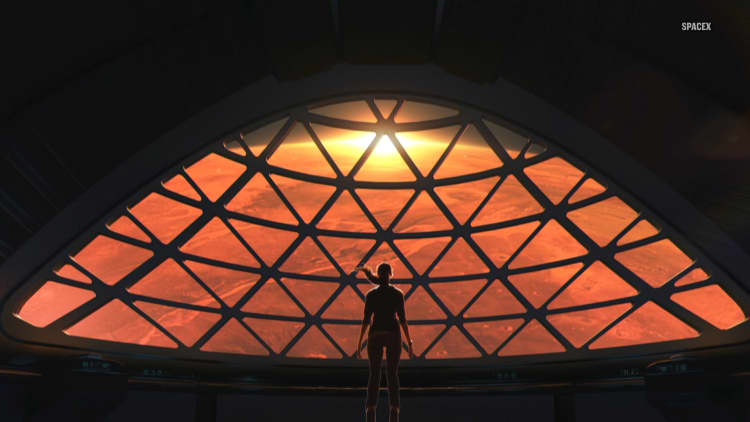Elon Musk says he is "confident" moving to Mars will "one day" cost less than $500,000 and "maybe even" cost below $100,000.
While the final cost is "very dependent on [the] volume" of travelers, Musk said the cost of moving to Mars will be "low enough that most people in advanced economies could sell their home on Earth [and] move to Mars if they want." (The median home price in the U.S. is $223,900, according to Zillow.)
The comment was part of a Twitter thread announcing the Raptor engine (the engine which will power the rocket's travels to Mars) has achieved the "power level needed for Starship and Super Heavy."
Raptor just achieved power level needed for Starship & Super Heavy
The Starship is the rocket (formerly called the BFR rocket) that SpaceX is building to go to Mars. The Raptor is the rocket engine that SpaceX is making to power the Starship. The Starship will have seven Raptor engines and the booster that launches the rocketship, called Super Heavy, will have 31 Raptor engines, a SpaceX spokesperson tells CNBC Make It.
The "aspirational goal" for SpaceX is to send the first rocket to Mars (with cargo only) in 2022, according to SpaceX's website. The second mission, which will take more cargo and crew, is aiming to go in 2024.
"The objectives for the first mission will be to confirm water resources, identify hazards, and put in place initial power, mining, and life support infrastructure," SpaceX website says. The second mission has "primary objectives of building a propellant depot and preparing for future crew flights. The ships from these initial missions will also serve as the beginnings of the first Mars base, from which we can build a thriving city and eventually a self-sustaining civilization on Mars."
In an article published in academic journal New Space in 2017, Musk also compared the price of trip to Mars to buying a house. At the time, he estimated trips to Mars would cost about $140,000 per ton (taking into account transporting things like luggage, food and life support). But he said at the time he believed the cost could potentially drop to below $100,000 a ton.
"It gets to the point where almost anyone, if they saved up and this was their goal, could buy a ticket and move to Mars — and given that Mars would have a labor shortage for a long time, jobs would not be in short supply," he said.
Musk has said there is a 70 percent chance he himself will go to Mars, once SpaceX gets "the price per ticket to maybe around a couple hundred thousand dollars," he told Axios in a November interview.
To be sure, being a pioneer on the red planet is not going to be an adventure for the faint of heart.
"It's gonna be hard, there's a good chance of death, going in a little can through deep space, you might land successfully, once you land successfully you'll be working non-stop to build the base — so not much time for leisure — and once you get there, even after all this, there's a very harsh environment, so there's a good chance you'll die there. We think you can come back but we're not sure," Musk told Axios.
Perhaps that's why Musk tweeted on Sunday that the return trip from Mars will be free.
See also:
Jeff Bezos: You can't pick your passions
Elon Musk: This is the 'why' of Tesla
Meet Tom Mueller: From Idaho logger to SpaceX co-founder who makes Elon Musk's rockets lift off

Like this story? Subscribe to CNBC Make It on YouTube!


